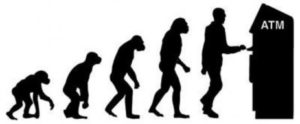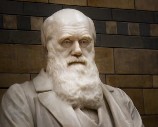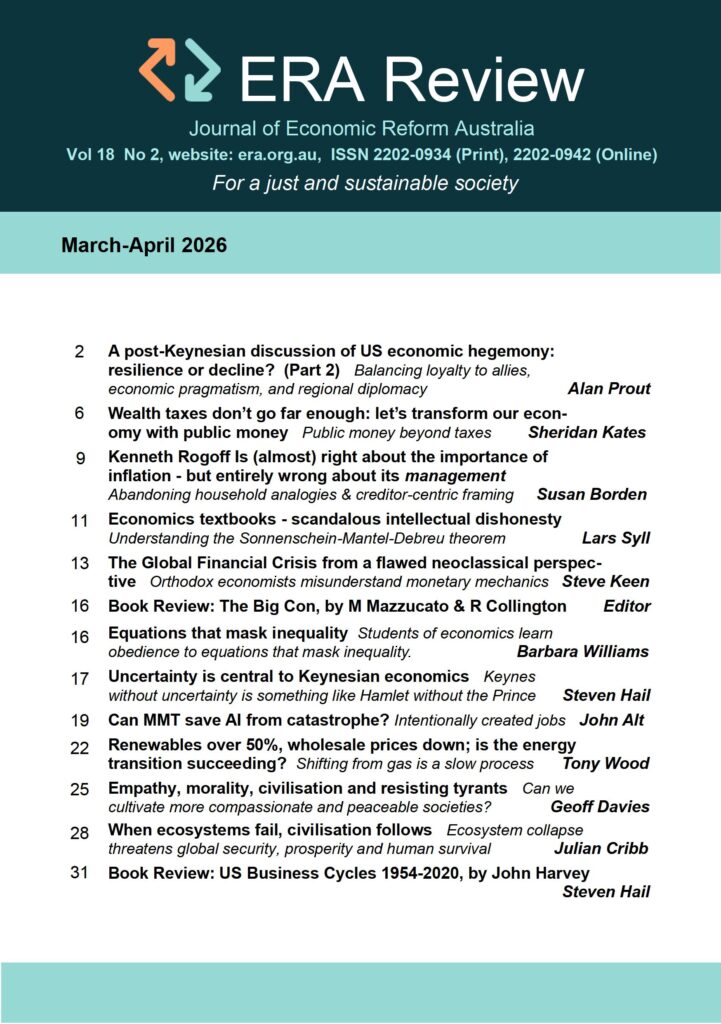Economics awaits a Darwinian revolution – Blair Fix
Modern economics, I have come to believe, resembles pre-Darwinian biology. By this, I mean that economics is captivated by an ideology that is stopping scientific progress. Let’s look at the parallels.
Before Darwin, biologists believed that life on Earth was created by God. This seductive idea stunted scientific progress for centuries. Much of the evidence for evolution – the fossil record, the similar anatomy of different species — was staring scientists in the face long before Darwin proposed his theory of evolution. But because life was viewed as God’s eternal creation, this evidence was mostly ignored.
Darwin’s “dangerous idea” [a] – evolution by natural selection – gave meaning to this evidence. Life was not an eternal order, Darwin proposed. Instead, it was an evolving system, driven by differential reproduction. The plethora of evidence for evolution now made sense.

In hindsight, Darwin’s idea seems obvious, almost trivial. But it was not at the time. Most scientists were unable to imagine alternatives to their ideology of an unchanging cosmos. The situation is much the same in economics today.
Like biologists before Darwin, economists are captivated by an ideology that envisions a static cosmos. According to orthodox economic ideology, humans are selfish utility maximizers. Given a perfectly competitive market, it follows from “natural law” that each person receives exactly what they produce.
This is the eternal order. Except it’s not.
Sitting before economists is a wealth of evidence for our evolved (and evolving) sociality. No more than 400 generations ago, humans lived in small tribes of a few dozen people. The first states were formed 200 generations ago. The first empires appeared 120 generations ago. And nation states appeared a mere 10 generations ago. Now we live in states with millions (sometimes billions) of people.
Like the pre-Darwinian biologists who ignored the evidence for evolution, economists mostly ignore the evidence for the evolution of human culture. It does not fit with their static worldview. Economics awaits its Darwinian revolution.
What’s needed is a theory that gives meaning to the evidence for human cultural evolution, and applies this evidence to the study of resource distribution. Fortunately, evolutionary-minded economists do not have to start from scratch. Sociobiologists have already done most of the work.
What puzzles sociobiologists is the capability of some types of animals (like humans) to behave both selfishly and cooperatively. This dual nature needs an evolutionary explanation. Sociobiologists think they have one. They have called it group selection (or multilevel selection).
I propose we use this theory of group selection to create an evolutionary theory of resource distribution.
[a] Darwin’s Dangerous Idea is the title of a book by philosopher Daniel Dennett.
Sources:
- Real World Econ Rev blogs, 5 Feb 2020 https://rwer.wordpress.com/2020/02/05/economics-awaits-a-darwinian-revolution/
- Blair Fix, “An evolutionary theory of resource distribution”, http://www.paecon.net/PAEReview/issue90/Fix90.pdf
Comment from Dr Steven Hail:
Interestingly, this is similar to a paper by Veblen published in 1898. Not exactly a new problem. Veblen was the original institutionalist, and so a forerunner of Minsky, who is a forerunner of MMT.
It was republished in 1998, on its centenary, in the Cambridge Journal of Economics [1].
The article questions the premise that the physics of equilibrium thermodynamics is relevant to analyzing economic systems.
The author suggested that the only rational approach is to assume that all economies evolve. He also argues that the economy can be described but has no effective theory of change and development.

1. Veblen, Thorstein; “Why is economics not an evolutionary science?”, https://www.semanticscholar.org/paper/Why-Economics-is-not-an-Evolutionary-Science-Veblen/524ffb8d68fa9152468c756bcd17c63e46c8bb57































